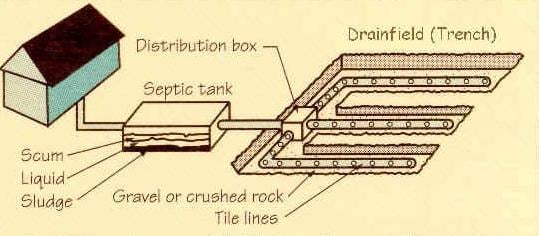
Homes not connected to a local sewer system use septic systems or cesspools, both of which are regulated by the state Department of Environmental Protection (DEP) and local boards of health. Local boards of health are the primary regulatory authorities; however, the DEP is involved in certain approvals.
 A septic system has a tank, a distribution box, and soil absorption system commonly known as a "leach field" or "leaching field." A cesspool has a pipe carrying waste from the home to a pit that distributes liquid waste.
A septic system has a tank, a distribution box, and soil absorption system commonly known as a "leach field" or "leaching field." A cesspool has a pipe carrying waste from the home to a pit that distributes liquid waste.
Improperly functioning septic systems and cesspools are a major cause of the pollution of our coastal waters, rivers, and water supplies. Since 1995, the state environmental code governing septic systems, commonly referred to as Title 5 regulations, has required inspections of septic systems and cesspools prior to a home being sold or enlarged. This inspection also includes a soil evaluation test, which a DEP-approved soil evaluator must perform. In most instances, systems that fail inspection must be repaired within 2 years.
Related: Real Boston: Greater Boston's Free Everything Residential Real Estate Newsletter
Wherever feasible, a failed system must be upgraded to full compliance with Title 5. If this is not possible, in many instances the local Board of Health is authorized to approve a "Local Upgrade Approval" that brings the system as close to full compliance as possible in accordance with certain minimum criteria. In such cases, homeowners must apply to a local board of health for a variance from Title 5 regulations.
Cesspools that exhibit signs of hydraulic failure, are located extremely close to private or public water supplies, or otherwise fail to protect or pose a threat to public health, safety or the environment will need to be upgraded. Also, cesspools must be upgraded prior to an increase in design flow (i.e., the addition of a bedroom).
When a Massachusetts homebuyer purchases land to build a new construction home that will need a septic system, a percolation test, commonly referred to as a "perc" test, must be completed to determine the design of the septic system.
A perc test is a test to determine the absorption rate of soil for a septic drain field or leach field. A percolation test consists of digging one or more holes in the soil of the proposed leach field to a specified depth, pre-soaking the holes by maintaining a high water level in the holes, then running the test by filling the holes to a specific level and timing the drop of the water level as the water percolates into the surrounding soil.
Home Buyer Resources
First-time Home Buyer Programs

Client: Kailee C.
"I really valued the level of professionalism and reliability that [he] consistently maintained. Further, I appreciated the timely manner in which he responded to my questions ..."
Client: Oksana P.
"No pressure approach made the process much easier ... in spite of an aggressive moving timeline."
Client: Geneva R.
"The service Buyers Brokers Only, LLC provided was truly invaluable to us in finding our first home. We couldn't be happier!"
Client: Mark V. & Laura V.
"It was an absolute pleasure to work with ... Buyers Brokers Only, LLC. There is absolutely no reason to use anyone else."

Call / Text (978) 835-5906